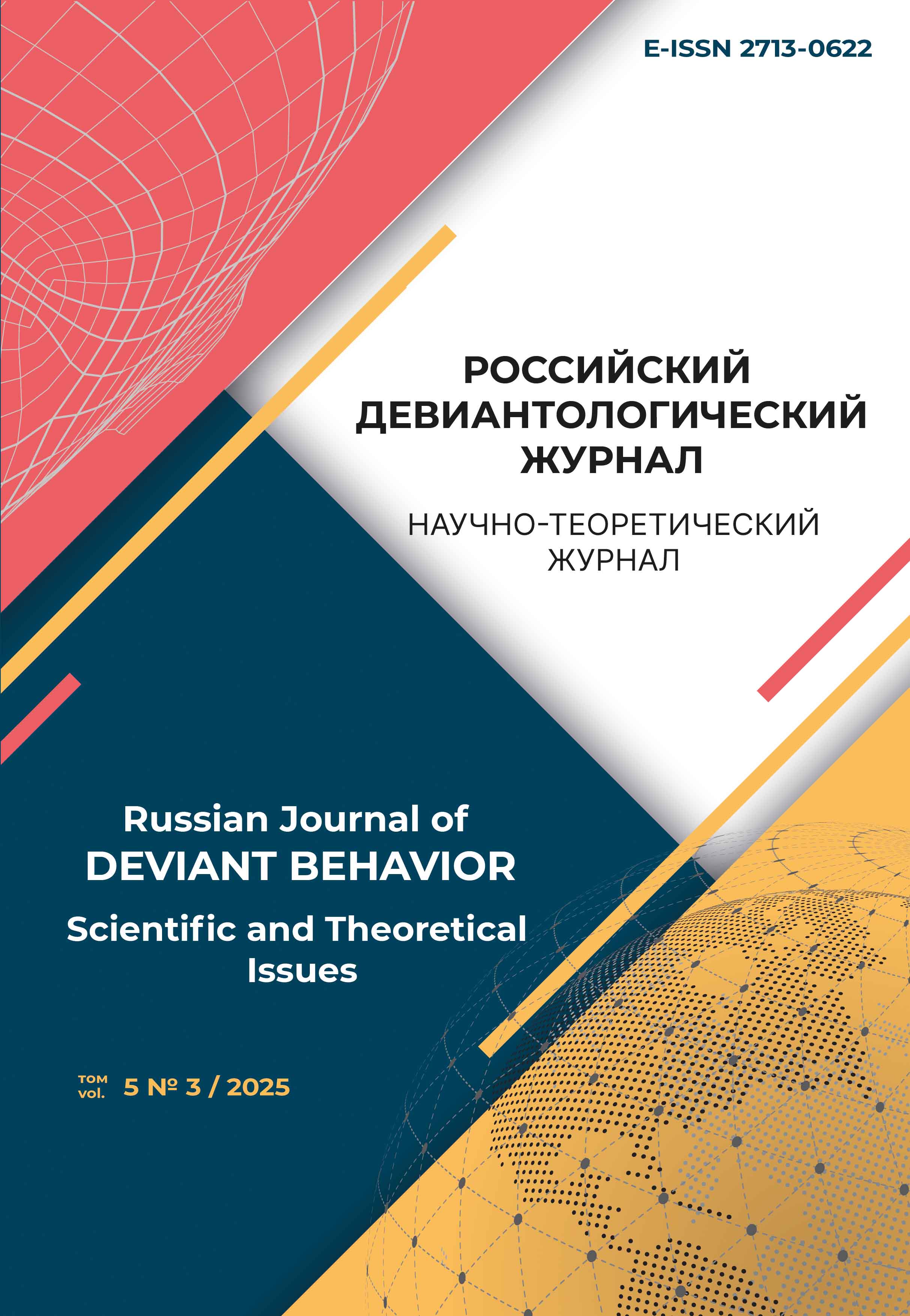Ekaterinburg, Russian Federation
UDC 316.624
The relevance of the research is conditioned by the digitalisation of social relations, reducing the level of legal self-awareness and increasing the risk of criminalisation of minors. Proportional to the explosive growth in criminal offences against this category of the population, there is a rising scientific interest in strategies for individuals to cope with stress caused by their interaction with society in legally significant situations. The relevance of this issue is reinforced by the methodological and applied tasks of forming legal self-awareness of minors and young people as a condition for the effective application of legal knowledge in social interaction. Therefore, the aim of the research is to develop a construct of coping responses of a person in situations of legal interaction and its operationalisation in the form of a methodology for studying legal coping strategies. The research methodology is based on the cognitive-behavioural approach, the theory of cognitive schemas and representations, the theory of legal consciousness, and the concepts of coping strategies. The research methods are used for analysing and systematising theoretical information about legal self-awareness and interaction, components of coping strategies for the purpose of conceptualising the construct of legal coping strategies. The empirical method involves questionnaire survey and assessment of internal consistency characteristics of scales operationalising the construct of legal coping strategies. Results. The theoretical result of the research is the development of a construct of legal coping strategies. The construct is based on the integration of the cognitive-behavioural approach, the concept of coping behaviour, and the theory of legal self-awareness. It made it possible to identify three main types of legal coping strategies (withdrawal, advocacy, adaptation) and their implementation in conscious and unconscious forms. The results of testing on a student sample (n=160) reveal satisfactory indicators of internal consistency. Due to the operationalisation of the construct, the ‘Profile of Legal Coping Strategies and Beliefs’ methodology has been developed, aimed at identifying individual strategies for coping with legal stressors in the context of the formation of legal self-awareness of a person. Methodological and practical prospects for further developing the construct and methodology in the areas of legal education, counselling, and prevention of legal disadaptation of minors and young people are substantiated.
legal self-awareness, coping strategies, legal stressors, psychodiagnostics of legal awareness, subjective regulation, legal behavior
1. Abrekova, N. T., Ponomar', E. V. (2024). Osobennosti sovladayushchego povedeniya u sotrudnikov pravoohranitel'nyh organov s raznym urovnem agressii. Yuridicheskaya psihologiya, 1, 5–8.
2. Andrianov, M. S. (2021). Psihologiya uchastnikov ugolovnogo sudoproizvodstva: koping-strategii poterpevshih. Psihologiya i pravo, 11 (2), 178–192.
3. Vetrenko, R. N. (2023). Lichnostnye osobennosti nesovershennoletnih pravonarushitelej s defektami pravovoj socializacii. V Yu. A. Sharanov, V. L. Sitnikov (red.), Aktual'nye problemy psihologii pravoohranitel'noj deyatel'nosti: koncepcii, podhody, tekhnologii (Vasil'evskie chteniya - 2023): materialy mezhdunarodnoj nauchno-prakticheskoj konferencii (Sankt-Peterburg, 20–21 aprelya 2023 goda, str. 148–153). Saint Petersburg: Sankt-Peterburgskij universitet MVD Rossii.
4. Grigor'eva, I. V., Hodzhaev, A. V., Gamova, A. V., Kononov, S. S. (2022). Vzaimosvyaz' koping-strategij s protivopravnym povedeniem zavisimyh ot alkogolya lic, nahodyashchihsya v lechebno-trudovom profilaktorii. Narkologiya, 21 (10), 47–53.
5. Emel'yanov, V. E. (2003). Pravosoznanie lichnosti: psihologo-pravovoj analiz. Moskow: YUniti-Dana.
6. Zautorova, E. V., Kevlya, F. I. (2022). Specifika psihologicheskoj zashchity u lic, otbyvayushchih nakazanie v mestah lisheniya svobody za prestupleniya protiv lichnosti, i korrekcionno-vospitatel'naya rabota s nimi. Penitenciarnaya nauka, 16 (1 (57)), 107–114. https://doi.org/10.46741/2686-9764.2022.57.1.011
7. Kuz'mina, A. S., Dovgan', K. E. (2024). YUridicheskaya kazuistika i problemy professional'nogo vygoraniya sudej. Psihologiya i psihotekhnika, 4, 12–23.
8. Laktionova, E. B., Pezhemskaya, YU. S. (2021). Ocenka psihologicheskoj bezopasnosti situacii i strategii sovladayushchego povedeniya podrostkov-pravonarushitelej. Psihologiya i pravo, 11 (3), 62–76. https://doi.org/10.17759/psylaw.2021110305
9. Lebedev, I. B. (2024). Koping-povedenie sotrudnikov OVD, osobennosti ego proyavleniya v usloviyah SVO. Vestnik Moskovskogo universiteta MVD Rossii, 1, 271–275.
10. Muslumov, R. R. (2019). Problemy formirovaniya pravovogo samosoznaniya lichnosti. Perspektivy nauki i obrazovaniya, 6 (42), 44–54.
11. Ratinov, A. R. (2016). Izbrannye trudy. Moskow: Akademiya General'noj prokuratury Rossijskoj Federacii.
12. Sabirova, R. Sh., Umurkulova, M. M. (2018). Professional'naya motivaciya policejskogo kak vedushchaya determinanta koping-povedeniya. Vestnik Orenburgskogo gosudarstvennogo universiteta, 8 (216), 98–103.
13. Smolyankin, V. V., Alaguev, M. V., Tudupova, T. C. (2023). Kontrol' stressa: opredelenie, primenenie, perspektivy issledovanij. Mir psihologii, 1 (112), 39–51.
14. Hitrova, A. V. (2024). Nravstvennye osnovy i pravosoznanie lichnosti: social'no-pravovoj aspekt. Simfe-ropol': OOO "Izdatel'stvo Tipografiya "Arial".
15. Hohlova, N. I., Shibaeva, L. V. (2024). Strategii preodoleniya stressovyh situacij yuristami zrelogo vozrasta. Severnyj region: nauka, obrazovanie, kul'tura, 25 (1), 48–53. https://doi.org/10.35266/2949-3463-2024-1-7
16. Cvetkov, V. L., Novosel'skaya, S. R. (2024). Issledovanie osobennostej proyavleniya mekhanizmov psihologicheskoj zashchity i koping-strategij u sotrudnikov organov vnutrennih del. Vestnik Moskovskogo universiteta MVD Rossii, 1, 294–302.
17. Chertovikova, A. S. (2024). Osobennosti koping-strategij osuzhdennyh, sostoyashchih na profilakticheskom uchete. Problemy sovremennogo pedagogicheskogo obrazovaniya, 84-2, 484–486.
18. Sharanov, Yu. A., Ustyuzhanin, V. N. (2018). Situacii neopredelyonnosti i slabostrukturirovannye problemy kak sistemnye atributy pravoohranitel'noj deyatel'nosti. Vestnik Sankt-Peterburgskogo universiteta MVD Rossii, 4 (80), 223–229.
19. Sharipova, F. A. k. (2024). Osobennosti koping-strategij i psihologicheskogo blagopoluchiya osuzhdennyh muzhskogo i zhenskogo pola. Psihologiya i pravo, 14 (4), 105–114. https://doi.org/10.17759/psylaw.2024140407
20. Cheng, C., Lau, H.-P. B., & Chan, M.-P. S. (2014). Coping flexibility and psychological adjustment to stressful life changes: A meta-analytic review. Psychological Bulletin, 140 (6), 1582–1607. https://doi.org/10.1037/a0037913
21. Ewick, P., & Silbey, S. S. (1998). The Common Place of Law: Stories from Everyday Life. Chicago: University of Chicago Press.
22. Lazarus, R. S., & Folkman, S. (1984). Stress, appraisal, and coping. New York: Springer Publishing Company.
23. Merry, S. E. (2006). Human Rights and Gender Violence: Translating International Law into Local Justice. Chicago: University of Chicago Press.
24. Skinner, E. A., Edge, K., Altman, J., & Sherwood, H. (2003). Coping as a central process in the development of competence. American Psychologist, 58 (4), 194–204.














